Python script packaging exe, auto-py-to-exe will help you!
Apr 13, 2023 pm 04:49 PM1. What is auto-py-to-exe
auto-py-to-exe is a graphic used to package Python programs into executable files ization tools. This article mainly introduces how to use auto-py-to-exe to complete python program packaging. auto-py-to-exe is based on pyinstaller. Compared with pyinstaller, it has an additional GUI interface and is simpler and more convenient to use.
2. Install auto-py-to-exe
First We need to ensure that our python environment is greater than or equal to 2.7 and then enter in cmd: pip install auto-py-to-exe. After the input is completed, pip will install the auto-py-to-exe package. After the installation is complete, we can enter: auto-py-to-exe in cmd to start the auto-py-to-exe program.
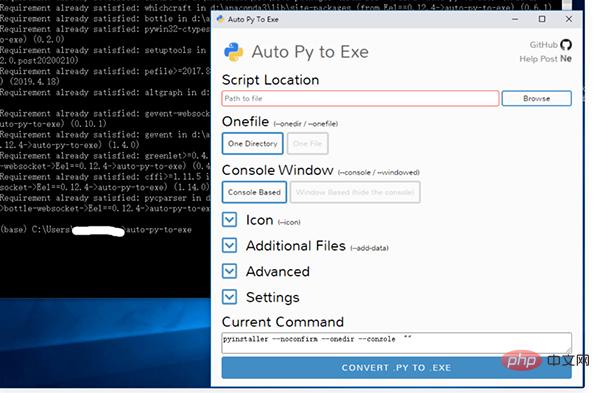
When the above picture appears, auto-py-to-exe is successfully installed.
3. Introduction to some options of auto-py-to-exe
When using auto-py-to-exe to package python programs, there are many configuration options that we need to specify. How to correctly It's important to know what these options do. Below I'll cover some of the important options.
(1) Script Location
Script Location mainly specifies the python file we want to package

(2) Onefile
There are two options under Onefile, namely: One Directory and One File
- If you select One Directory, the program will be displayed in the form of a folder after packaging is completed
- If you select One File, then after the program packaging is completed, there will be an .exe file
(3) Console Window
Console Window mainly sets whether the console appears when the packaging program is running
- Console Based: When the packaged program is run, a console interface will be displayed
- Window Based (hide the console): The console interface will be hidden, mainly used for programs with GUI python program packaging
(4) Icon
Icon used to specify the packaged program
4. auto-py-to-exe actual combat
This section mainly uses a calculator program to introduce how to use auto-py-to-exe to package the program.
auto-py-to-exe packaging program is mainly divided into 3 parts, namely:
- Open auto-py-to-exe
- Configure packaging options
- Check the packaging effect
1. Open auto-py-to-exe
Open cmd, enter: auto-py-to-exe Open auto-py- to-exe, we have to make configuration selections.
2. Configure packaging options
Calculator program, you can download it from GitHub, the address is: https://github.com/pythonprogrammingbook/simple_calculator
In packaging At this time, the configuration we need to perform mainly includes:
- Script Location
- Onefile
- Console Window
Script Location Select the program For the main program, in the calculator project, we choose main.py
Onefile Select One File because one file looks simpler
Since the calculator project has a GUI, Console Window Select Window Based (hide the console),
Icon Select an ico file, this operation is not required, you don’t need to set it
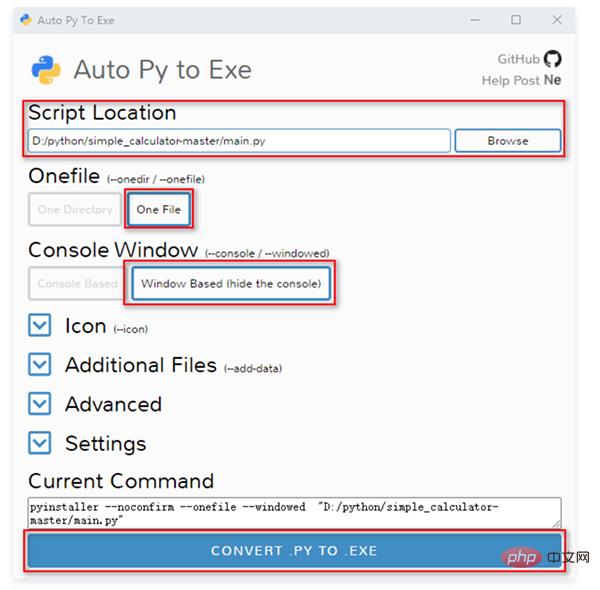
If there is one in the program For our own module, we must add the module's directory to Additional Files. Otherwise, the Failed to execute script XXX error will appear

#In the calculator program, all our modules are in the calculation directory, so we need to add the calculation path to Additional Files.
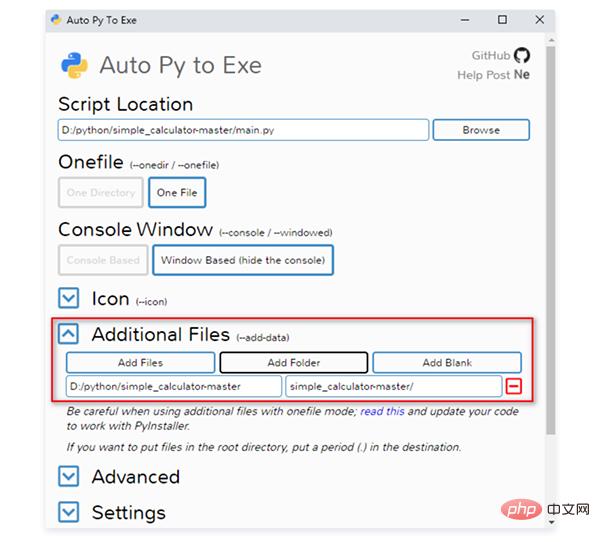
After the configuration is completed, click the CONVERT .PY TO .EXE button
In this way, we have completed the packaging of a calculator project.
3. View the packaging effect
After the program completes packaging, we can click the OPEN OUTPUT FOLDER button, and then the path to the packaged file will be opened.
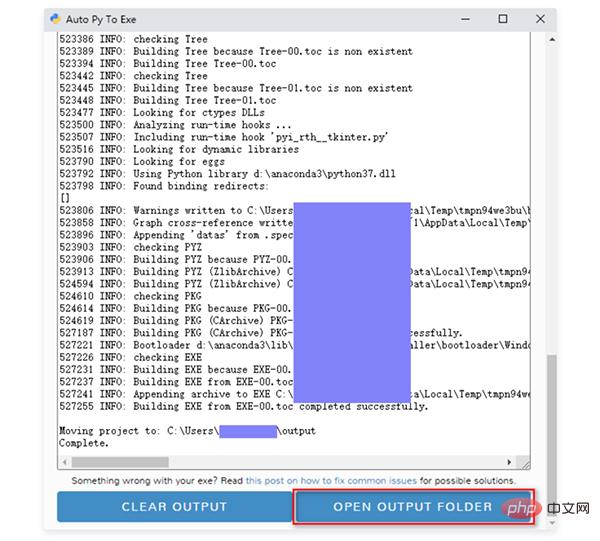
In the packaging file directory, we can see a main.exe file, which is our packaging file.
Click main.exe and you will see a calculator program.
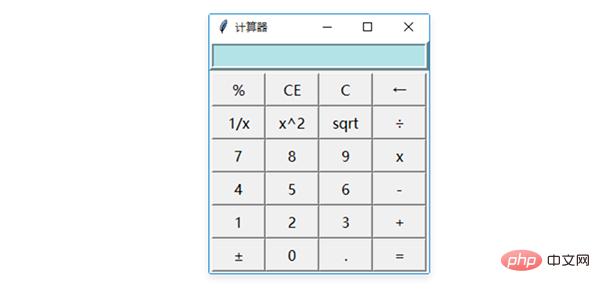
At this point, the packaging work has been successfully completed.
5. Summary
This article mainly introduces how to use auto-py-to-exe to package python programs. But this only introduces the simplest Python program packaging. If you want to package complex programs, the above configuration will definitely not work.
If you want to know more about auto-py-to-exe, I suggest you study pyinstaller. auto-py-to-exe is based on pyinstaller. Studying pyinstaller will have a very obvious effect on our in-depth use of auto-py-to-exe.
If you want to know more about pyinstaller, you can read the official documentation.
The above is the detailed content of Python script packaging exe, auto-py-to-exe will help you!. For more information, please follow other related articles on the PHP Chinese website!

Hot AI Tools

Undress AI Tool
Undress images for free

Undresser.AI Undress
AI-powered app for creating realistic nude photos

AI Clothes Remover
Online AI tool for removing clothes from photos.

Clothoff.io
AI clothes remover

Video Face Swap
Swap faces in any video effortlessly with our completely free AI face swap tool!

Hot Article

Hot Tools

Notepad++7.3.1
Easy-to-use and free code editor

SublimeText3 Chinese version
Chinese version, very easy to use

Zend Studio 13.0.1
Powerful PHP integrated development environment

Dreamweaver CS6
Visual web development tools

SublimeText3 Mac version
God-level code editing software (SublimeText3)

Hot Topics
 What are python iterators?
Jul 08, 2025 am 02:56 AM
What are python iterators?
Jul 08, 2025 am 02:56 AM
InPython,iteratorsareobjectsthatallowloopingthroughcollectionsbyimplementing__iter__()and__next__().1)Iteratorsworkviatheiteratorprotocol,using__iter__()toreturntheiteratorand__next__()toretrievethenextitemuntilStopIterationisraised.2)Aniterable(like
 How to iterate over two lists at once Python
Jul 09, 2025 am 01:13 AM
How to iterate over two lists at once Python
Jul 09, 2025 am 01:13 AM
A common method to traverse two lists simultaneously in Python is to use the zip() function, which will pair multiple lists in order and be the shortest; if the list length is inconsistent, you can use itertools.zip_longest() to be the longest and fill in the missing values; combined with enumerate(), you can get the index at the same time. 1.zip() is concise and practical, suitable for paired data iteration; 2.zip_longest() can fill in the default value when dealing with inconsistent lengths; 3.enumerate(zip()) can obtain indexes during traversal, meeting the needs of a variety of complex scenarios.
 What is a forward reference in Python type hints for classes?
Jul 09, 2025 am 01:46 AM
What is a forward reference in Python type hints for classes?
Jul 09, 2025 am 01:46 AM
ForwardreferencesinPythonallowreferencingclassesthatarenotyetdefinedbyusingquotedtypenames.TheysolvetheissueofmutualclassreferenceslikeUserandProfilewhereoneclassisnotyetdefinedwhenreferenced.Byenclosingtheclassnameinquotes(e.g.,'Profile'),Pythondela
 Parsing XML data in Python
Jul 09, 2025 am 02:28 AM
Parsing XML data in Python
Jul 09, 2025 am 02:28 AM
Processing XML data is common and flexible in Python. The main methods are as follows: 1. Use xml.etree.ElementTree to quickly parse simple XML, suitable for data with clear structure and low hierarchy; 2. When encountering a namespace, you need to manually add prefixes, such as using a namespace dictionary for matching; 3. For complex XML, it is recommended to use a third-party library lxml with stronger functions, which supports advanced features such as XPath2.0, and can be installed and imported through pip. Selecting the right tool is the key. Built-in modules are available for small projects, and lxml is used for complex scenarios to improve efficiency.
 What is descriptor in python
Jul 09, 2025 am 02:17 AM
What is descriptor in python
Jul 09, 2025 am 02:17 AM
The descriptor protocol is a mechanism used in Python to control attribute access behavior. Its core answer lies in implementing one or more of the __get__(), __set__() and __delete__() methods. 1.__get__(self,instance,owner) is used to obtain attribute value; 2.__set__(self,instance,value) is used to set attribute value; 3.__delete__(self,instance) is used to delete attribute value. The actual uses of descriptors include data verification, delayed calculation of properties, property access logging, and implementation of functions such as property and classmethod. Descriptor and pr
 how to avoid long if else chains in python
Jul 09, 2025 am 01:03 AM
how to avoid long if else chains in python
Jul 09, 2025 am 01:03 AM
When multiple conditional judgments are encountered, the if-elif-else chain can be simplified through dictionary mapping, match-case syntax, policy mode, early return, etc. 1. Use dictionaries to map conditions to corresponding operations to improve scalability; 2. Python 3.10 can use match-case structure to enhance readability; 3. Complex logic can be abstracted into policy patterns or function mappings, separating the main logic and branch processing; 4. Reducing nesting levels by returning in advance, making the code more concise and clear. These methods effectively improve code maintenance and flexibility.
 Implementing multi-threading in Python
Jul 09, 2025 am 01:11 AM
Implementing multi-threading in Python
Jul 09, 2025 am 01:11 AM
Python multithreading is suitable for I/O-intensive tasks. 1. It is suitable for scenarios such as network requests, file reading and writing, user input waiting, etc., such as multi-threaded crawlers can save request waiting time; 2. It is not suitable for computing-intensive tasks such as image processing and mathematical operations, and cannot operate in parallel due to global interpreter lock (GIL). Implementation method: You can create and start threads through the threading module, and use join() to ensure that the main thread waits for the child thread to complete, and use Lock to avoid data conflicts, but it is not recommended to enable too many threads to avoid affecting performance. In addition, the ThreadPoolExecutor of the concurrent.futures module provides a simpler usage, supports automatic management of thread pools and asynchronous acquisition
 What is a class in Python?
Jul 09, 2025 am 01:13 AM
What is a class in Python?
Jul 09, 2025 am 01:13 AM
Classes in Python are blueprints for creating objects, which contain properties and methods. 1. An attribute is a variable belonging to a class or its instance, used to store data; 2. A method is a function defined in a class, describing the operations that an object can perform. By calling the class to create an object, for example, my_dog=Dog("Buddy"), Python will automatically call the constructor __init__init__init object. Reasons for using classes include code reusability, encapsulation, abstraction, and effective modeling of real-world entities. Classes help keep the code clear and maintainable when building complex systems.







